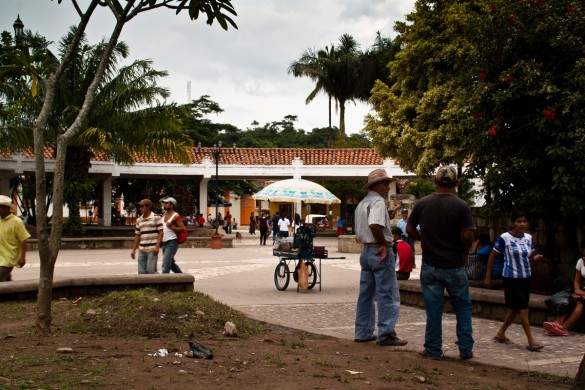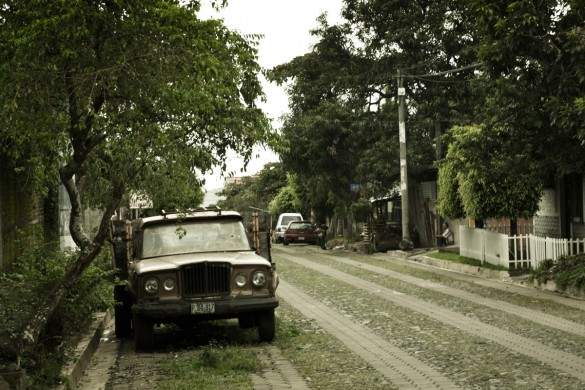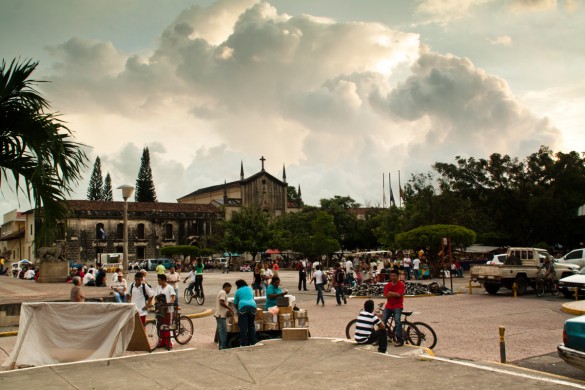The difference between a job you like and “just a job” is whether or not you like the whole process on a daily basis. A cook who likes his job does not just like the food, but he also likes to prepare it. A writer must not only like stories, but also to create them.
This can also be related to independent traveling, a traveler does not just like the destination but also the way of getting there. Even though being a traveler is not my job – I wish – I do love the means of getting from one place to another.
One of my favorite aspects of traveling is the overland border crossing. Unlike arriving on an international airport where you hand in your passport, answer a couple of questions, follow some other country specific protocol – like taking finger prints or providing a bribe – and receiving your stamp, there’s not much to it. Unless you’ve got twenty cocaine filled condoms in your stomach that need to get out as soon as possible, you have not much to worry about.

With overland border crossings you never know what to expect.
Will there be a “check-out” for the country you’re leaving, or only a check-in?
Will there be a lot of people?
Will there be transportation within the no man’s land or will I have to walk?
Will I need to pay some kind of obscure tax to get in and if so, in which currency?
Will I be able to change the five hundred Pesos, Dinars or Rupees I still have left?
No matter how many people you talk to and how many reports you read on the Internet, chances are always quite high you’ll be running into some kind of surprise while crossing an overland border.
But that’s what makes it fun, doesn’t it?
After having crossed the Mexican-Guatemalan, Guatemalan-Honduran, Honduran-El Salvadorian and El Salvadorian-Honduran border, I felt quite confident I knew my way around Centro-American borders. This was before we arrived in Guasaule, the most Southern border crossing between Honduras and Nicaragua.
As we were in the middle of wet season, the number of North American or European travelers was quite low. This results in a much higher competition between salesmen whose living is based on these travelers. We must have looked like diamonds to these people – really scruffy diamonds though – because long before our minivan stopped at its endpoint, money changers were running next to it, soda sellers raised their goods through the window and taxi drivers were trying to move our backpacks from the rack into their trunk.
If you’ve been traveling to less developed countries, you might recognize this scenario, and every traveler has their own way on how to react to it. Some answer to whom yells the loudest, some start to yell back and others create some kind of mini auction where they make the “businessmen” bid to each other for the best price.
My overall strategy is to ignore everyone who yells into my ear, pulls my clothes or even touches me, and walk over to the most quiet taxi driver or money changer or tour guide or whatever I need at that moment.
In Guasaule however, things went slightly different. I had read that the two borders are quite far from each other and that some sort of taxi is the advised way of crossing. It was also getting late in the afternoon, and we still had a couple of buses to take until our final destination. So when we noticed that our backpacks were already stacked on a bike taxi the moment we got out the van, I thought of it as a pleasant coincidence.
“Look, this guy has already taken our packs into his taxi. Hmmm, that’s actually quite rude, but hey, we need a taxi anyway, let’s ride with him.” I should have known that this was a bad idea. Especially when the driver told me that he didn’t have a fixed price because he did not know how long it would take to get us to the other side.
Also his unhealthy interest in the amount of money I was planning to change should have rung a bell, but it didn’t.
Getting out of Honduras is like a walk in the park. The taxi driver dropped us off at the immigration desk, I showed the officer our passports, together with the receipt that we already paid the three dollar tourist tax when entering the country. Some tick-tock on the computer and a smiling face wished me a good trip.
The face of the immigration officer at the Nicaraguan side of the border was set to thunder that afternoon. After repeatedly having to cough, seek eye contact and wave my passport in front of his window he finally walked over and took the passports. This went together with a couple of grunts to make sure that I understood that he was not pleased to be taken out of his twenty fifth coffee break by some gringo. A couple of grunts later, combined with some finger signals meant that it was time for me to cough up 270 cordobas per passport for tourist tax. A final grunt meant that he did not understand my Spanish and thus is was planning to give me back the sixty cordobas I’d paid too much. He gave me a receipt for eighty cordobas,; his face told me that this too was not questionable and soon he was in the middle of coffee break number twenty six.

About twenty meters further the taxi dropped us off again at a “ticked office”, where I needed to show the receipt from immigration and receive two small pieces of yellow paper with a stamp on ‘em. From the back of the pieces we learn that they had once been part of a larger sheet of scratch paper which has been cut into “tickets”.
It looked ridiculous, but who am I to question Nicaraguan bureaucracy? Another fifty meters further, there was a bridge with two military officers requesting our ticket. After we’d handed it over, they started talking to the taxi driver in some fast and incomprehensive – to me – Spanish. I imagine the conversation must have gone something like this:
Officer: You are going to earn quite a buck on these gringos, we want a part of it.
Taxi driver: Screw you, I saw them first, I know how much money they have left and it’s all mine.
Officer: If we don’t let you go through, the gringos will not pay you and you’ll get nothing
Taxi driver: You can’t stop me, I paid a bribe to your superiors only yesterday.
Officer: Let us then at least make it difficult and uncomfortable.
At that moment the officer pointed his AK47 towards me and commanded me to open my backpack. Then he asked for our passports again, going through every single page but without paying attention to it at all. Then it was Lindsay’s turn to open her backpack, meanwhile the officers and the taxi driver kept mumbling to each other.
Without having a single look inside our open backpacks, the officer ordered us to close them again, loaded them back into the taxi and moved on. Like we’d just passed a major security check.
Once over the bridge was another checkpoint. As we had already passed a migration officer, a military officer and some ticket guy, I had no idea who the guy who’s asking for our passports this time could be. But he had a government uniform, complete with gun, so I was glad to give him the passports.
Things were not well. Our passport was stamped with the date of yesterday.
I can imagine that this may be a bit suspicious, if I actually had entered Nicaragua yesterday and for some reason had to go back to Honduras for the night, I might have tried to skip the twelve dollar entrance fee by showing up with the same stamp again. But I didn’t do this and the taxi driver was my witness.
That wasn’t enough evidence though, so the officer of I-don’t-know-what took his cell phone and called the immigration officer to check his stamp. Of course the guy did not pick up his phone because he was at coffee break thirty seven, so eventually we were allowed to enter the country with a day old stamp. Days later we figured out that the stamp in our passport was indeed the right one and that that last officer thought we were one day later. Probably because that day would have been a Sunday.
Having crossed all border controls it was time to get off the taxi and… pay. The taxi driver starts counting: “You changed 1500 Lempiras into 1100 Cordobas, You’ve paid 600 cordobas at the border, you need about 200 Cordobas for the bus to the next city, which means you need to pay me 300 Cordobas”. When you get into a taxi without discussing the price, you have no right of discussion afterwards, but I’m not a big fan of entering a country totally broke so I try something else:
Me: “What about if I pay you in Lempiras?”
Taxi driver: “Oh you still have Lempiras, how many?”
Me: “Eh, that’s not really any of your business, how much do I owe you in Lempiras?”
Taxi driver: “You can pay me 500 Lempiras and 300 Cordobas”.
Suddenly the price had tripled. This seemed not very fair to me at all, so I started a discussion about price agreements and exchange rates, and in the end we agreed on the price of 400 Lempiras.
The driver knew however that I had three hundred spare Cordobas so until the very last moment he tried to sell me bus upgrades for a hundred Cordobas, better seats for fifty Cordobas and eventually tricked me with “The minibus leaves now if you pay only twenty Cordobas more”. I paid the twenty Cordobas to the bus driver, who went to the side with the taxi driver, who received something and then took off. We got into the bus and waited for another half hour before it was totally full and took off.
It wasn’t after more than two kilometers, I guess, before we had to stop for a road block. Narcotics control. “I know this routine from Guatemala”, I told Lindsay, “the driver will get out, slip some money into the officer’s pockets and soon after we’ll be cruising again”. The driver did get out, but was probably too cheap to pay a bribe. So the officers opened the doors of the bus, looked inside and pointed to…us.

Officer: “bla bla bla bla bla” (very fast and in Spanish)
Me: “Perdon, no comprendo”
Officer: “bla bla bla bla bla documentation”
Me: “eh?”
Officer: “do – cu – men – ta – tion” (like he was talking to someone really stupid or really deaf)
I handed over the passports.
Officer: “more documentation”
I had no clue what he needed more. I figured the passports were the only documents we’d need, they were sufficient for crossing the border. So I gave the guy my I-have-not-single-clue-of-what-you’re-asking-me look. My mimics don’t seem to be very universal because I got a similar look back with the same question for more documentation.
By that moment my strategy was to look at the officer as if someone just sucked ninety five percent of my brains out.
The officer eventually pointed to my hand luggage and after I opened it up he picked out my travel guide, pointed to it and said: “DOCUMENTATION!!”
Presumably the travel guide is pure evidence that we’re no drug smugglers, because a couple of easy – like where are your clothes? – questions later, we were on our way again.
This whole border crossing procedure has cost us over fifty dollars and three hours of our time. A two person ticket at Six Flags costs about the same and – unless you really pick the wrong day – the queue will normally not be more than an hour. I expected at least Mickey Mouse or Speedy Gonzales to welcome me to Nicaragua.